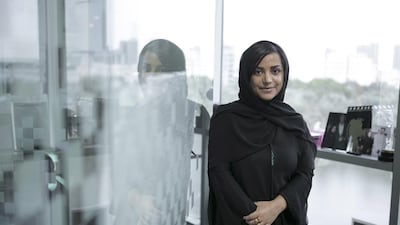Some of the region’s leading female filmmaking talent gathered at the film and TV industry trade show Cabsat at Dubai World Trade Centre last week to talk about their careers and the challenges they face.
They were assembled by Japanese camera manufacturer Canon to help promote the local launch of its new C700 cinecamera.
Encouragingly, none of those we spoke to felt they had been passed over for a job because of their gender – and most had been hired for corporate and commercial work alongside their creative projects.
In fact, some of the group felt being a woman could be an advantage in what, globally, remains a male-dominated industry, particularly for directors.
“I was lucky in that I was here right at the start and people would feel sorry for you as a woman,” says Nayla Al Khaja, director of Animals and Malal.
“People would give you equipment because they felt sorry for you.
“Things have shifted dramatically since then, but I think there’s more support than at any time before and that being a woman is a huge added advantage, as you stand out in a male-dominated industry. When I shot Malal in India [in 2010] there were two women out of a crew of 92.”
Most of the problems cited were filmmaking challenges that apply equally to men and women, with obtaining financing the most common.
“There are projects that pay and projects that don’t pay – passion projects,” says wardrobe mistress and fashion designer Sandhya Lallo-Morar.
She has worked on some of the biggest UAE productions, including animated historical epic Bilal and Ali F Mostafa’s From A to B.
“Sometimes I’ll do a project because I know I’ll get paid at the end,” she says.
“My passion projects will do something for my soul. You have to try to find the right balance and pick and choose your projects.”
Ayesha Chagla heads the Dubai Film Market, the industry arm of the Dubai International Film Festival, where regional filmmakers can go for professional advice and funding.
“Regionally, there isn’t that much financial support out there for film, so you have to have a day job,” she says. “People have to survive.”
Some filmmakers said attempting to describe the challenges facing female filmmakers in the region was redundant.
“I don’t think it’s possible to talk about challenges facing Middle Eastern women in films because that implies the whole Middle East is the same and the challenges are the same, and it’s not,” says Tanya Daud, a graduate of the Arab Film Studio, who was worked on Image Nation movies, including He Named Me Malala, as well as making her own documentaries. “The challenges in Syria are very different to those in Dubai, for example.”
Chagla says she is not aware of any regional challenge that makes it any more difficult for women to get their films made than men.
“In fact, in the Middle East I think we have less of a problem than the West does in terms of there not being enough female filmmakers,” she says.
“If you have a story to tell, you have a story to tell.”
She adds that the challenges are more on a social level.
“It’s difficult to get a film made per se, and even more difficult with a foreign-language film,” she says.
“I don’t think those challenges are gender-based.
“There is a problem where filmmakers of any gender may be expected to make a couple of short films as a hobby, then get a real job in the family business.
“It’s not a gender thing, more of a cultural thing with the notion of filmmaking not being a profession as such.”
Saudi-Syrian filmmaker and children’s author Khadijah Kudsi agrees.
“When I told my family and husband I was going into filmmaking it was an earthquake,” she says. “Everyone thought it wasn’t a respectful job.
“There’s a real taboo attached. It’s seen as a bad business that’s associated with sex and drugs.
“Now when they see my films they are actually very proud of me.
“I think if a male said the same thing they would be concerned about his income not his morals, because it’s not sustainable.”
Ultimately, though, most of our interviewees seemed to agree that while the challenges facing local filmmakers are plentiful – cultural taboos, censorship and the lack of a distribution infrastructure being other issues frequently mentioned – gender was not one of them.
It was a refreshing discovery, though clearly there is still a long way to go in plenty of other areas before the UAE can proudly claim to have a fully developed film industry.
cnewbould@thenational.ae

